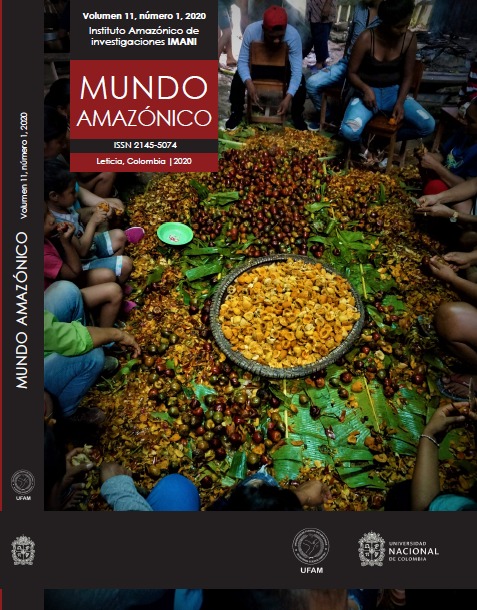Ari’s Burger: Vignettes of Iquitos (Part 3)
Ari’s Burger: Viñetas de Iquitos (Parte 3)
Ari’s Burger: Vinhetas de Iquitos (Parte 3)
DOI:
https://doi.org/10.15446/ma.v11n1.83570Keywords:
ayahuasca, Iquitos, narrative, Banisteriopsis caapi (en)ayahuasca, Iquitos, narrativa, Banisteriopsis caapi (es)
ayahuasca, Iquitos, narrativa, Banisteriopsis caapi (pt)
Downloads
This is the final episode of a three-part story about a visit to Iquitos at the time of the new millennium by the narrator, who lives in Colombia and has been drinking yajé (ayahuasca) with its indigenous shamans. For a book he is writing about the subject, decides to investigate its uses in Iquitos, where his host and guide to the rituals there is “Zappa”, an American expatriate who exports shamanic plants and runs ayahuasca ceremonies. Zappa is now trying to exploit a traditional plant remedy for diabetes and is unwittingly caught up in an international intrigue to do with the U.S. war against drugs. This episode starts when, after several disappointing ceremonies with unqualified or ill-intentioned healers, the narrator drinks ayahuasca with a skilled and ethical shaman.
Este es el episodio final de una historia de tres partes sobre una visita a Iquitos en la época del nuevo milenio por el narrador, quien vive en Colombia y ha estado tomando yajé (ayahuasca) con sus chamanes indígenas. Por un libro que está escribiendo sobre el tema, decide investigar sus usos en Iquitos, donde su anfitrión y guía de los rituales es "Zappa", un expatriado estadounidense quien exporta plantas chamánicas y dirige ceremonias de ayahuasca. Zappa ahora está tratando de explotar un remedio vegetal tradicional para la diabetes y es involuntariamente atrapado en una intriga internacional relacionada con la guerra contra las drogas de los Estados Unido. Este episodio comienza cuando, después de varias ceremonias decepcionantes con sanadores no calificados o mal intencionados, el narrador bebe ayahuasca con un chamán experto y ético.
Este é o episódio final de uma história de três partes sobre uma visita a Iquitos na época do novo milênio pelo narrador, que mora na Colômbia e bebe yajé (ayahuasca) com seus xamãs indígenas. Para um livro que está escrevendo sobre o assunto, decide investigar seus usos em Iquitos, onde seu anfitrião e guia para os rituais é o “Zappa”, um expatriado americano que exporta plantas xamânicas e realiza cerimônias de ayahuasca. Zappa agora está tentando explorar um remédio tradicional para diabetes e sem querer é apanhado em uma intriga internacional relacionada à guerra dos EUA contra as drogas. Este episódio começa quando, após várias cerimônias dececionantes com curandeiros desqualificados ou mal-intencionados, o narrador bebe ayahuasca com um xamã hábil e ético.
References
Weiskopf, Jimmy. (2017). Ari’s Burger: Vignettes of Iquitos. Mundo Amazónico 8(2): 107-117. http://dx.doi.org/10.15446/ma.v8n2.67867
Weiskopf, Jimmy. (2018). Ari’s Burger: Vignettes of Iquitos (Part 2). Mundo Amazónico 9(2): 229-241. http://dx.doi.org/10.15446/ma.v9n2.74951
How to Cite
APA
ACM
ACS
ABNT
Chicago
Harvard
IEEE
MLA
Turabian
Vancouver
Download Citation
License
Copyright (c) 2020 Jimmy Weiskopf

This work is licensed under a Creative Commons Attribution-NonCommercial-NoDerivatives 4.0 International License.
Authors are responsible of all the authorizations that the publication of their contributions may require. When the manuscript is accepted for publication, authors must send a formal declaration about the authenticity of the work, assuming personally the responsibility for all the contents of the article, and explicitely indicating their right to publish it. Publication of a contribution in Mundo Amazónico does not imply the cession of copyright by the authors; however, sending a contribution to this journal represents an authorization by the authors to the Editors of Mundo Amazónico to publish it. In case that the authors reprint, totally or partially, an article previously published in Mundo Amazónico, either in its original language or in translation, the original source must be cited. The articles published in the journal are covered by a Creative Commons 4.0.
The authors who publish in this magazine agree with the following terms:
- The authors retain the copyright and grant the magazine the right of the first publication, with the work simultaneously licensed under a Creative Commons Attribution License that allows others to share the work with the acknowledgment of authorship and the initial publication in this journal.
- Authors may make additional contractual arrangements for the non-exclusive distribution of the version published in the journal (for example, placing it in an institutional repository or publishing it in a book), with recognition of its initial publication in this journal.















